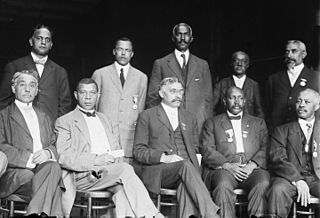Related Research Articles

Booker Taliaferro Washington was an American educator, author, orator, and adviser to several presidents of the United States. Between 1890 and 1915, Washington was the dominant leader in the African American community and of the contemporary black elite. Washington was from the last generation of black American leaders born into slavery and became the leading voice of the former slaves and their descendants. They were newly oppressed in the South by disenfranchisement and the Jim Crow discriminatory laws enacted in the post-Reconstruction Southern states in the late 19th and early 20th centuries.

UNCF, the United Negro College Fund, also known as the United Fund, is an American philanthropic organization that funds scholarships for black students and general scholarship funds for 37 private historically black colleges and universities. UNCF was incorporated on April 25, 1944, by Frederick D. Patterson, Mary McLeod Bethune, and others. UNCF is headquartered at 1805 7th Street, NW in Washington, D.C. In 2005, UNCF supported approximately 65,000 students at over 900 colleges and universities with approximately $113 million in grants and scholarships. About 60% of these students are the first in their families to attend college, and 62% have annual family incomes of less than $25,000. UNCF also administers over 450 named scholarships.

Whitney Moore Young Jr. was an American civil rights leader. Trained as a social worker, he spent most of his career working to end employment discrimination in the United States and turning the National Urban League from a relatively passive civil rights organization into one that aggressively worked for equitable access to socioeconomic opportunity for the historically disenfranchised.

The National Negro Business League (NNBL) was an American organization founded in Boston in 1900 by Booker T. Washington to promote the interests of African-American businesses. The mission and main goal of the National Negro Business League was "to promote the commercial and financial development of the Negro." It was recognized as "composed of negro men and women who have achieved success along business lines". It grew rapidly with 320 chapters in 1905 and more than 600 chapters in 34 states in 1915.

Lugenia Burns Hope, was a social reformer whose Neighborhood Union and other community service organizations improved the quality of life for African Americans in Atlanta, Georgia, and served as a model for the future Civil Rights Movement.

Charles Clinton Spaulding was an American business leader. For close to thirty years, he presided over North Carolina Mutual Life Insurance Company, which became America's largest black-owned business, with assets of over US$40 million at his death.

Monroe Nathan Work was an African-American sociologist who founded the Department of Records and Research at the Tuskegee Institute in 1908. His published works include the Negro Year Book and A Bibliography of the Negro in Africa and America, a bibliography of approximately seventeen thousand references to African Americans.

Ariel Serena Hedges Bowen was an African-American writer, temperance activist, and professor of music at Clark University in Atlanta in the late 19th and early 20th centuries. Twentieth Century Negro Literature (1902) noted that "she is regarded as one of the foremost and best cultured women of her race."

The Logan family are African Americans descended from Warren Logan and his wife Adella Hunt Logan. This African American family has become part of the educated, professional black elite in the United States.

Henry Alexander Hunt was an American educator who led efforts to reach blacks in rural areas of Georgia. He was awarded the Spingarn Medal by the National Association for the Advancement of Colored People (NAACP), as well as the Harmon Prize. In addition, he was recruited in the 1930s by President Franklin D. Roosevelt to join the president's Black Cabinet, an informal group of more than 40 prominent African Americans appointed to positions in the executive agencies.
The William E. Harmon Foundation Award for Distinguished Achievement Among Negroes, commonly referred to as the Harmon Award or Harmon Foundation Award, was a philanthropic and cultural award created in 1926 by William E. Harmon and administered by the Harmon Foundation. It was offered for distinguished achievements in eight different fields: literature, music, fine arts, business and industry, science and innovation, education, religious service, and race relations.

Emmett Jay Scott was a journalist, founding newspaper editor, government official and envoy, educator, and author. He was Booker T. Washington's closest adviser at the Tuskegee Institute. He was responsible for maintaining Washington's nationwide "machine," with its close links to the black business leadership, white philanthropists, and Republican politicians from the local level to the White House. After Washington job he lost his Tuskegee connection but moved to Washington as Special Adviser of Black Affairs to Secretary of War Newton D. Baker. Scott was the highest-ranking African-American in President Woodrow Wilson's administration. After 1919, he was less and less visible in national affairs, with the NAACP taking the leadership role that Booker T. Washington had dominated.
William Johnson Trent, Jr. (1910-1993) was an African-American economist, non-profit director and civil rights activist from Atlanta, Georgia.

Bazoline Estelle Usher was an American educator known for her work in the Atlanta Public Schools. As director of education for African-American children in the district prior to integration, she was the first African American to have an office at Atlanta City Hall. She founded the first Girl Scout troop for African-American girls in Atlanta in 1943. Her career as an educator lasted over 50 years, over 40 of which were in the Atlanta schools. A school in Atlanta is named for her, and in 2014 she was posthumously named a Georgia Woman of Achievement.
Claude Albert Barnett was an American journalist, publisher, entrepreneur, philanthropist, civic activist, Pan-Africanist, and founder of the Associated Negro Press (ANP). He started the first international news agency for black newspapers. He was an advocate against segregation in the military and blood supply. He was an activist force in journalism. He promoted Pan-Africanism. The (ANP) documented the Civil Rights Movement in the United States of America, and struggles for independence in Africa. Associated Negro Press was a Pan-African news service. Claude Barnett, Robert S. Abbott, and John H. Johnson were three of the most influential African-American media entrepreneurs in the 20th century. They were based in Chicago, Illinois. Barnett is said to have advanced the role of the Black Press in press coverage, news sharing, advertising, public relations, and professionalism.
Rhoda Kaufman was an American social activist from Georgia. A Jewish woman born to German immigrants, she moved to Atlanta after graduating from college and participated in numerous social activist organizations.
Helena Maud Brown Cobb was an American educator and missionary from Georgia. Born in Monroe County, Georgia, she attended Atlanta University and served as an educator and principal at many schools for African Americans in the state. She was also active in organizing and pushing for greater missionary opportunities for women within the Colored Methodist Episcopal Church.

Atlanta's Berlin Wall, also known as the Peyton Road Affair or the Peyton Wall, refers to an event during the civil rights movement in Atlanta, Georgia, United States in 1962. On December 17 of that year, the government of Atlanta, led by Atlanta mayor Ivan Allen Jr., erected a barricade in the Cascade Heights neighborhood, mostly along Peyton Road, for the purposes of dissuading African Americans from moving into the neighborhood. The act was criticized by many African American leaders and civil rights groups in the city, and on March 1 of the following year the barricade was ruled unconstitutional and removed. The incident is seen as one of the most public examples of white Americans fears of racial integration in Atlanta.
Kenneth F. Space (1903–1971) was a prominent pictorial journalist, documentary filmmaker, cinematographer and commercial photographer in the 1930s and 1940s. He is most known with his photographic and documentary film work capturing African American life in the American South for the Harmon Foundation.
References
- ↑ "Holsey, Albon L. | Encyclopedia.com". www.encyclopedia.com.
- ↑ "Guide Text-Booker T. Washington Papers. National Negro Business League Correspondence, 1922 (A-B)". memory.loc.gov.
- ↑ Thomas, Richard W. (August 22, 1992). Life for Us Is What We Make It: Building Black Community in Detroit, 1915--1945. Indiana University Press. ISBN 0253113156 – via Google Books.
- ↑ Litwack, Leon F. (August 24, 1999). Trouble in Mind: Black Southerners in the Age of Jim Crow. Vintage Books. ISBN 9780375702631 – via Google Books.
- ↑ Hutchinson, George (August 24, 1995). The Harlem Renaissance in Black and White. Harvard University Press. ISBN 9780674372627 – via Google Books.
- ↑ "National Negro Health News". United States Public Health Service. August 24, 1950 – via Google Books.